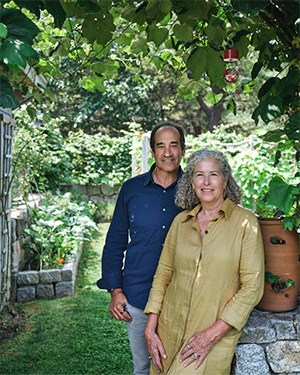Donor Profile: Jesse and Betsy Fink
Summer 2025 Issue
 Donor Profile: Jesse and Betsy Fink
Donor Profile: Jesse and Betsy Fink
The Long-Term Impact of Giving: Transforming Philanthropy into Systemic Change
- Judy Gelman Myers
Jesse '79 and Betsy Fink '79 are environmental problem solvers. Their foundation—The Betsy and Jesse Fink Family Foundation, whose mission is to “move communities toward a more balanced, sustainable relationship with the environment”—invests in people and organizations like ESF that promote best environmental practices.
As part of the Campaign for SUNY ESF, the Finks have doubled their contributions to The Betsy and Jesse Fink Career Development Program at ESF, which they founded in 2018. They’re also extending their longtime support for the Center for Native Peoples and the Environment as well as the Restoration Science Center. “Our foundation funds and supports environmental organizations and thought leaders across the spectrum. Supporting ESF is really important to us because it's formed who we are and gave us a foundation for our environmental work,” said Jesse.
The Finks’ support for ESF is part of a giving strategy called systemic investing. It’s a novel approach that seeks long-term solutions to problems by transforming the systems that produced the problems in the first place. That means engaging varied stakeholders throughout the system to produce multifactorial, holistic solutions.
“The career development team played a big role in getting me my first job at Georgia-Pacific. As a result, I personally want to do everything we can to help students get an internship or fellowship so when they graduate, they’ll have a better chance of getting a job they want."
Jesse Fink
For example, in 2014, the Finks set out to tackle the problem of food waste by breaking down silos and convening policy experts, farmers, and specialists at NGOs and government agencies, creating a roadmap to reducing food waste which ultimately led to the creation of ReFED, the nation’s leading nonprofit dedicated to ending food loss and waste. Other Fink initiatives address biodiversity and habitat loss, including in their community on Martha’s Vineyard, where Molly Jacobson ‘21, pollinator ecologist from ESF’s Restoration Science Center, contributed to data collection and analysis for the MV Pollinator Pathways Project. The project involved planting curated pollinator plots on eight Martha’s Vineyard farms and conducting intensive monitoring to assess pollinator diversity and provide recommendations for farms, landowners, and municipalities to support a broader range of pollinators.
The Finks’ philanthropy weaves together their environmental goals, ESF training, choice of initiatives, and their investment strategies. Jesse and Betsy met at ESF in 1978: Betsy studied environmental and forest biology while Jesse pursued Resource Management. Both went on to pursue graduate work—Betsy at ESF while Jesse pursued his MBA at Syracuse University. They married in 1982 and moved to New York City. Later in his career, Jesse ventured into the world of internet start-ups, co-founding Priceline, where Betsy also held a leadership position. When Jesse and Betsy transitioned from Priceline, they seized the opportunity to dedicate themselves fully to the environmental causes they cared most about.
Jesse is still grateful to ESF for helping launch his career. That gratitude took the form of The Betsy and Jesse Fink Career Development Program at ESF. “The career development team played a big role in getting me my first job at Georgia-Pacific. As a result, I personally want to do everything we can to help students get an internship or fellowship so when they graduate, they’ll have a better chance of getting a job they want,” he said. The program also funds internship-related expenses, such as travel.
Betsy’s undergraduate studies in forest ecology and restoration nurtured a deep commitment to biodiversity and sustainability. This path led to the Finks providing funding for the Restoration Science Center and the Center for Native Peoples and the Environment, whose founding director, Dr. Robin Wall Kimmerer ’75, has had a profound impact on Betsy. “Storytelling is a powerful tool for helping people understand and care about how we use and relate to the natural world – and few have done this more powerfully than Robin, whose work inspires more thoughtful and respectful stewardship of our shared resources,” said Betsy.
Philanthropy is more than giving for the Finks. It’s investing in ways to heal the world. “ESF is a proven institution,” said Jesse. “It's been around for over 100 years. It harvests high-quality students who become incredibly passionate environmental problem solvers. At the end of the day, problems are solved by people, and ESF is a great institution that cultivates wonderful people to do great things.”
